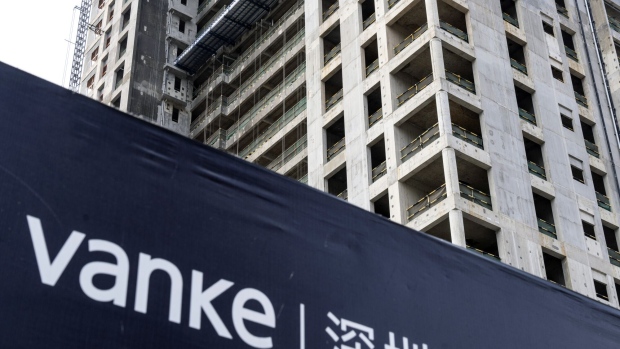Apr 25, 2024
China Vanke Crisis May Continue to Spell Trouble for Chinese Lenders
, Bloomberg News

(Bloomberg) -- Greater China’s property market crisis and the challenges it poses for lenders will be on full display on Monday, when embattled developer China Vanke Co. and the region’s biggest banks report earnings.
Vanke told brokerages that it’s making plans to resolve liquidity pressure and short-term operational difficulties. The firm is preparing an asset package totaling about $18 billion to use as collateral as it seeks new bank loans, people familiar with the matter said earlier this month.
Its crisis spells trouble for the country’s major banks, including Bank of China Ltd., Agricultural Bank of China Ltd., Industrial & Commercial Bank of China Ltd., and China Construction Bank Corp. Lenders may hesitate to finance developers including Vanke amid government pressure to fund so-called white-list projects, Bloomberg Intelligence said. Loan growth may moderate to high-single digits in 2024 due to muted demand, BI analyst Francis Chan said.
Loan risks are also rising for lenders HSBC Holdings Plc and Standard Chartered Plc in Hong Kong, threatening their commercial real estate and mortgage quality, he added.
Highlights to look out for:
Monday: China Vanke’s (2202 HK) first-quarter results will reveal how tight its cash coverage of short-term debt is after inconclusive talks over a plan to swap bonds for secured debt and an extension of private debt. Contracted sales likely plunged 43% in the first quarter and the average selling price was probably 8.5% lower than a year earlier, BI said.
- Industrial & Commercial Bank of China (1398 HK), China Construction Bank (939 HK), Agricultural Bank of China (1288 HK), and Bank of China (3988 HK) face sluggish revenue prospects as China seeks to support the debt-ridden property sector. Policies like a public-housing push and extending funding to white-list developers may hurt lenders, BI said.
Tuesday: HSBC’s (HSBA LN) pretax profit probably fell 2% as the mainstay lending business saw weakness in Asia, based on estimates compiled by the bank. HSBC is expected to have raised loan loss provisions and will book a $1 billion one-time loss on the sale of its business in Argentina. The bank also started a new round of job cuts across its investment banking division in Asia, people familiar with the move said on April 16.
- Bank Mandiri’s (BMRI IJ) first-quarter earnings should be supported by strong loan growth in the corporate-commercial segment, which makes up more than half of its loan book, as Indonesia boosts infrastructure-project planning, BI said.
- Samsung Electronics’ (005930 KS) final results are due after preliminary results early this month showed a sharp profit rebound in the first quarter, thanks to semiconductor and Galaxy S24 smartphone sales. The company’s revenue climbed 12% in the latest quarter from the same period a year earlier, according to analyst estimates.The firm is expected to be one of the key beneficiaries of solid state drive demand momentum for artificial intelligence training, Citi analysts said.
Thursday: Standard Chartered (STAN LN) will probably report a drop in first-quarter pretax profit, partly because of higher provisions. BI analysts said the focus will be on financial markets and wealth management income in light of its 2026 targets. Look for updates on its new cost-cutting program to save $1.5 billion over the next three years.
- DBS’s (DBS SP) profit outlook appears relatively healthy, BI said. Net interest income growth may have slowed from a year earlier, with further margin compression on expectations of Fed rate cuts and low-single-digit loan growth. Heightened scrutiny from regulators after recent digital outages may result in more severe penalties. New family-office rules in Singapore and the inclusion of Citigroup’s retail-banking assets in Taiwan probably boosted its wealth-management business.
- NAB (NAB AU) will probably post a drop in first-half earnings, weighed down by lower revenue as concern about a recession in Australia increases. BI analyst Matt Ingram says NAB’s profit may drop by 27% in 2024 if nonperforming loans rise to 2009 levels.
(Updates with Samsung revenue estimate)
©2024 Bloomberg L.P.





